Around St. Patrick's Day I remember hearing about a shooting in Florida. Something about neighborhood watch and a bag of Skittles. As the story developed, media focused on the fact that the hoodie the African-American teen was wearing was the cause for the shooting. More information comes out and the names Trayvon Martin and George Zimmerman are repeated by media with cloudy facts. Incidents like this have happened all across the country. Why do we have to ask questions about motives for shooting an unarmed boy? Giving the situation further thought, I recognize exactly why. And it made me sad. In the Trayvon case, protest by wearing a hoodie has even reached Congress. I agree with Congressman Rush's statements that racial profiling has got to stop. Trayvon's death is just another example of frighteningly consistent murders that have not gotten the same level of media attention. Earlier this year I got to see Howard McGary discuss the Post-Racial Ideal. What he highlighted was that while we want to get beyond race, it's still hampering our society. Racism is painfully prevalent. In the late 80's and early 90's, rising racial tensions were expressed by the messages of Spike Lee, Rev. Al Sharpton and Public Enemy. Even clothing companies were making statements about equality through advertising, Benetton being the most aggressive. Journalists followed the anger that simmered and roared to a boil in 1992 with the L.A. Riots. The news coverage was incredible and frightening. People were identifying ways to get angry, specifically about race and inequality, but were reporters trying to avoid bias? As a teen during that time, I was like a sponge to what was happening around me. My high school supported the 220 Program that encouraged bringing inner-city minorities to suburban schools, and vice versa. Over time, that became a way for many families to move to the community. It was also the way that I got to know people. Not black people, not "inner-city minorities". PEOPLE. After an implied racial insult from a ban on baseball caps, the school assembled a multi-cultural group to discuss the problems. We all had very different perspectives, but we also had respect and understanding because we grew up together. I didn't realize the hurt and inequity that several of my classmates felt. Perhaps my view was too naive because I rode the strange border of being multiracial. In 2011, Milwaukee was identified as the most segregated city in the U.S. I grew up here and know the city quite well. Good or bad, Milwaukee is a strangely complicated city, and there are very defined borders that stratify people in a variety of oddly detailed ways. Northside, Southside, Black, White, Polish, Italian, Punk, Prep, Poor, Affluent. Where these groups overlap can sometimes represent the opportunity for community. What the Trayvon Martin case has made me realize is that people don't recognize each other as people. We are categories. That is what creates fear and aggression. Recent racial slurs used by ESPN in reference to Jeremy Lin and South Korea's soccer team enforce racist assumptions. You can insult Asian-Americans because they won't complain. Of course an African-American is a criminal. Of course a Caucasian is the victim. The news tells me these things on a regular basis and encourages narrow-minded profiles. While I hope for better, for now it's just like Grandmaster Flash said in his song " White Lines", "...that's the way it goes."
One of the greatest opportunities you have as a student is to meet experts in your field of study. Unlike professional networking events and seminars, the guest speaker offers a more candid and intimate perspective on their industry. It's inspiring and motivating. The energy that it creates can be channeled into productivity and a commitment to a higher level of performance. Mike Gousha's visit to JOUR4953 did exactly that. After giving a brief overview of his background as a journalist to his role at Marquette's Law School, Gousha led the conversation through the changing face of media. There are new forces at play and this new school has changed the manner in which the news is being presented. News groups like MSNBC and Fox are giving news in a format that is aggressive and opinionated. Even local news has been altered by the new school methods. Daytime news continues to follow traditional straightforward reporting, but evening programs have given themselves over to the need to offer perspective and opinion on the material they are reporting. This trend calls for awareness of how your news sources are reporting to you and determine whether they are providing "a lot of fire and not so much light." Gousha's adherence to the old school journalism is both a philosophical and professional choice. His opinion is that journalists have to remain unbiased in order to provide the facts to the public. Reporters are supposed to be a "force for public good" and give their audience the tools needed to make their own opinions. Civil discourse is essential to this perspective. Sunday mornings, Gousha's program UpFront does exactly that. With balanced interviews with leaders who can have an impact on all of Wisconsin, he provides | |
non-inflamatory information on controversial subjects. His On The Issues program at Marquette offers the same type of discourse. Mike Gousha brought intense ideas, intelligence and insight to our class. It was wonderful to see how much his conversation enhanced the group and drew insightful questions from my classmates. Additionally, it gave Herbert Lowe the chance to give us more of his real-life experience and share his understanding of the world of journalism. The amount of positive energy that was stirred up gave me a brighter outlook on the influence of my fellow students and the opportunity they have to be a driving force in journalism.
I was really eager to find out more from Charles Franklin, Founder of PollsandVotes.com and the Director of the Marquette Law School Poll about online poll standards. As noted in my previous blog post, he paid JOUR4953 a visit this week. Franklin had a good deal more than that to share and I believe that he brought our group a better understanding of the value of polling. Much of it had to do with his enthusiasm and self-proclaimed "OCD" on the topic. To highlight some problems with poll data reporting, Franklin mentioned a Time Magazine Poll on George W. Bush's approval ratings that really he said still "sticks in my craw!" His contention was that when you don't look at the aggregate data and only take the results from two points/dates, you not only miss the actual change, you use misleading data. From his example, I was concerned with how I had been looking at and possibly misusing data. Franklin's discussion flowed into why message control matters and why opinion polls matter. Wording that pollsters use can mitigate or create bias. Asking someone a question like "have you stopped beating your dog?" gives them no real choice. Organizations that are paying for a poll may actually be anticipating the results they want and will framework the questions to meet their needs. As he explained the finer points of polling needs, use and impact, I realized that the work went beyond writing questions. Analysis of polling data is a statistical nightmare, or dream-come-true if you like that kind of thing. When Franklin was asked to define margin of error, he avoided giving us the formula above and kept it simple. Consider doing the same poll 20 times, with a margin of error of 3 points, you would get the exact same results 19 times with only one resulting in a variance of 3. I say, trust the experts. Luckily, I was able to ask why Franklin said that online polling was still in an "R&D" phase. His response required him to first explain that sampling is a proven statistical model, "You don't have to drink the whole pot of soup to make sure it'll taste good!" Methodology also requires randomization and equal distribution, which he equated to stirring the pot of soup and grabbing a spoonful to sample. Truly an effective way to explain something that is overly statistical. Phone polling participation has gone from 90% down to 20% in the past two decades, but still follows proven methodology. Online sampling will need to find a way to develop a statistical model that can prove accuracy from a non-random sample group. I'm glad he clarified, but I'm fully convinced that online polling will be the method of the future. I am also certain that soup is in my future, too!
| |
Polling has an impact on a variety of industries. My background in marketing and public relations has certainly required use of polls. For online retailers a "fun" poll on their website creates an interaction with a visitor that has the potential for them to share the poll with friends. These less sophisticated, entertainment type polls can also be used to create media buzz. As noted in the New York Times polling standards, datal like this wouldn't be the model of accuracy, but it could be used in discussion and to bring some levity to the commentary. Since 2000, BuyCostumes.com has been able to use this poll for mentions in national media with great success. While a poll regarding mask sales is interesting, political polls hold much higher requirements in the selection of their sample group, method of data collection and analysis for presentation of their findings. While watching the presentation of the February 2012 "On the Issues: Marquette Law Poll" in class, my curiosity was piqued when Charles Franklin highlighted how wording impacts responses. In the presentation, Franklin showed the question regarding iron-ore mining in Northern Wisconsin as posed by the Marquette Law Poll compared to the question the PPP used on the same issue. The differences in wording enforced the responsibility of the poll conductor to remove bias and avoid inferring which answer is "right". As a journalist, the level of insight into how a poll is conducted can also mean maintaining a high level of skepticism. To help avoid the use of lower quality polling data, most organizations set standards that exclude new media data collection. In preparation for Franklin's visit to my JOUR4953 class, I was motivated by the February 15, 2012 post on his blog, PollsandVotes.com, "...a tremendous number of state polls are not reportable because they lack live interviewers, randomized in-household selection, and omit cell phones." If an online poll can provide unbiased questions, target a legitimate sample and have a secure method of reporting, I agree with Franklin's position that new methods can be used as appropriate sources. Clearly a retailer poll isn't where I would look to collect information to report on Super Tuesday's voting, but the option to refer to online polls shouldn't be eliminated. Fewer and fewer people have landlines and of that number, many are unwilling to participate in polls. With some enforceable standards and transparency into the collection methods, online polling will take a place as a valid resource.
TampaBay.com has been making great strides in their election coverage. Although the Tuesday evening headline focused on Gingrich's clear win in Georgia, Romney's photo referenced his predicted win in Massachusetts. The Times also posted an article about the potential "heat" that Santorum was bringing against Romney in Ohio. The RNC is coming to Tampa the week of August 27th and will be meeting at the Tampa Bay Times Forum. A good reason to update their website! The main Politics tab now features an "RNC 2012" page which includes a delegate counter and opinion pieces. | |
Staying true to their Florida-centricity, the new page has articles aimed at the benefits the convention will bring to local businesses. Another new feature is the "RNC Local Guide" that lists the Top 10 Things to do in Tampa. Rooftop bars, restaurants and venues for parties drive the content in that area. They are very eager for the tourism/travel dollars to flow through the area. Can you blame them? The boost to the local economy is definitely more exciting to Floridians than any of the GOP candidates. | | In an article titled 5 Things We Learned From Super Tuesday, Times Political Editor, Adam C. Smith, provides his insight on the problems the GOP faces over the next few months. His points are strong, and very accurate: 1. The Republican National Committee badly miscalculated with its 2012 primary schedule.Smith concludes that the drawn out schedule has given Obama the advantage. As the Republicans are still muddling through the primaries, Obama's approval ratings are on the rise and Democrats are preparing campaign offices for the general election. 2. It's all about delegates.With the looming number of 1144, the likelihood of Santorum passing Romney grows further from reality - especially when he isn't on the Washington D.C. ballot, and the 19 delegates they offer. 3. Republicans face an enthusiasm gap.You can say that again! Voter turnout has lagged and the candidates are basically lackluster. |
4. The strongest reason for Gingrich to stay in the race is personal ego.
'Nuff said.
5. When it counts, Romney comes through.
Again and again, he balances things out. Every loss is followed by wins. At a total of 415 votes he now stands 87 votes ahead of his three opponents cumulative 328.
I think that the Tampa Bay Times held off on election coverage until it was of importance to their readers. An appropriate approach when there has been enough local and state news to occupy their staff and provide content for their website. Super Tuesday has come to mark the time for dropping out, and it will be interesting to see what happens through April 3rd.
|
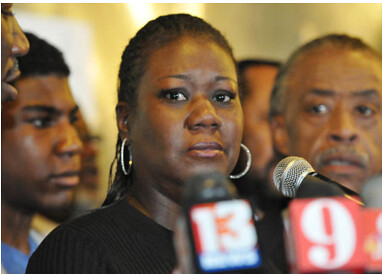




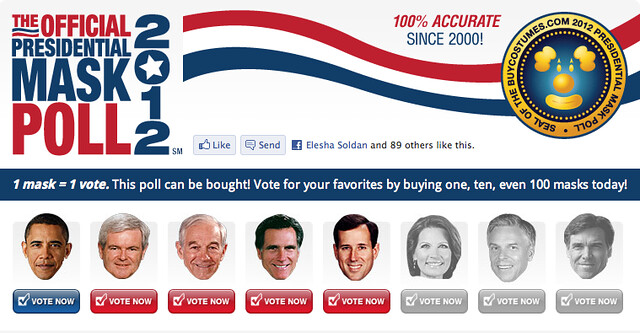
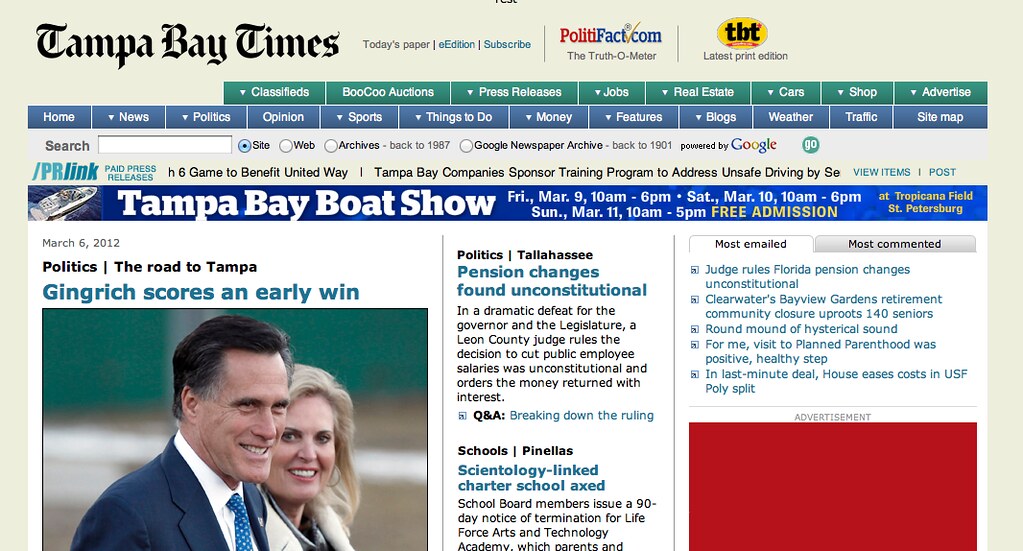
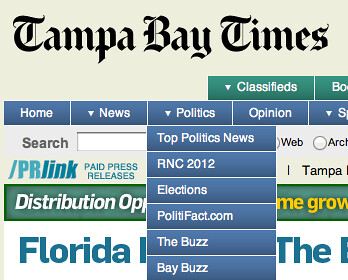
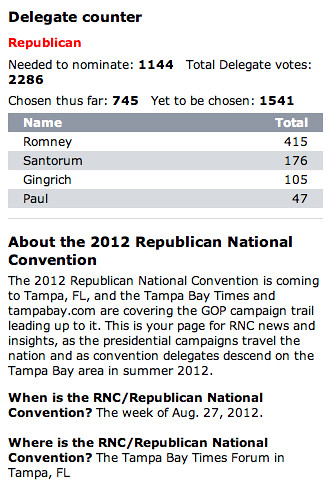

 RSS Feed
RSS Feed